- Market-Inspector.co.uk
- Blog
- Card Payment Machine for Small Business
Card Payment Machine for Small Business in the UK - 2025 Guide

How a Card Payment Machine for Small Business Works
A card payment machine, also known as POS terminal, credit card terminal, PDQ machine or EFTPOS terminal, is a device that allows businesses to process payments electronically. POS systems do the same but they often perform additional functions too.
PDQ machines connect to a payment provider network via landline or internet connection. After the network authorises the card, funds can be transferred to the merchants accounts.
Typical features of the card payment machines for small business include:
Whether you are a big retailer or an independent merchant, accepting card payments from your customers has many benefits. A credit card payment machine for small business can increases sales and ensures all payments from customers are received directly.
However, there are some things to consider before going through the setup of a credit card payment machine.
This guide contains all information you need to choose the best card payment machine for small business. Click on the links below to read an evaluation of the top five providers on the market:
| Provider | Transaction Fee | Machine cost | Add ons |
|---|---|---|---|
| iZettle Card Reader 2 | 1.75% | £59 + VAT | The app includes: Stands & Docks Receipt Printers Barcode Scanners Cash Drawer Store Kits |
| SumUp Air Card Reader | 1.95% | £59 + VAT | No official add-on products |
| Paypal Here | 2.75% | £75 (incl. VAT) | Taxi Cab Bundle Bouncepad Retail Stands Fast Charge Cradles POS desk stands and mounts |
| Square Card Reader | 1.75% | £39 + VAT | Track employee performance Inventory management Sync with other apps and softwares |
| Worldpay Zinc | 2.75% with no monthly fee 1.95% with £5.99 a month | £39.99 (incl. VAT) | Phone payment via the app |
Disclaimer: Please note that the different types of models mentioned above are based on market research and not necessarily available through Market Inspector.
Does Your Small Business Need a Card Payment Machine?
In this dynamic and technologically advanced world, credit card machines for small businesses are a necessary tool that business owners need to use and rely on frequently. Taking credit card payments using credit card processing terminals have become a widely popular, and often the expected payment method.
As we think about chip and pin solutions in the context of a card payment machine for small business, there are some factors to consider in order to evaluate the necessity of a credit card machine. Sometimes disadvantages may outweigh the potential benefits if the business is really small. In fact, 49% of small businesses in the UK still prefer not to take card payments.
Barcleycard Research recently published a study that shows four ways how not taking card payments can impact your business.
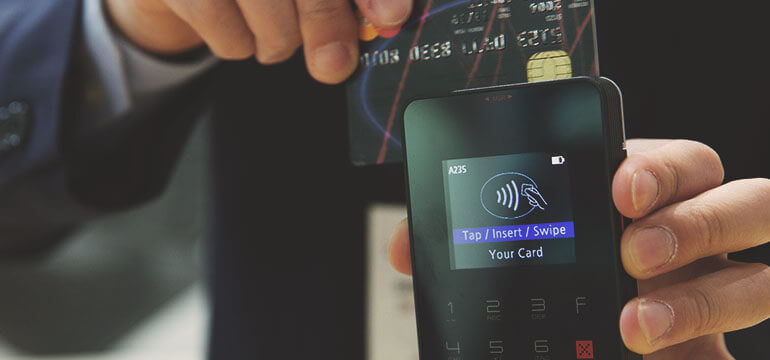
According to a study from the The UK Cards Association, using debit and credit cards for payment has more than doubled in the past 10 years. It clearly shows how online retail has driven a change in the way consumers pay.
The growth in the number of card transactions in the past ten years has outstripped the rise in the amount spent, showing consumers’ growing preference for using cards for even lower value payments. The report also says that we can expect the increasing use of contactless and mobile payment, particularly by younger people who will be the major source of growth for card payments which will have an impact on the future of payments in the United Kingdom.
Contactless card payments are almost 25% faster than other mobile credit card machines and transactions below £30 are approved within seconds.
Pros and Cons of Card Payment Machine for Small Business
Using card payment machines as a small business owner offers some unquestionable advantages. It does not only expand purchasing options for your customer but it is also easier, faster, and safer than ever. Card payment machines for small businesses also opens the door to a more flexible way of taking payments where no cash handling is necessary, and making it impossible to give the wrong amount of change.
However, there are some potential drawbacks we should also consider. Accepting credit card payments means that you have to take on additional fees to operate your business and extra work to keep track and balance of these payments. Finally, the personal and financial data can easily be compromised if the payment taking process is not supported by solid security features. In this unfortunate case, it is often the merchant who loses out.
| Advantages | Disadvantages |
|---|---|
| Faster and safer payments | Additional charges for the payment terminal and transaction processing service |
| Impossible to give the wrong amount of change | Possible one time startup fee |
| No cash handling is necessary | Card-not-present transactions require an introduction of extra steps for verifying the identity of the cardholder |
| Offering different payment methods might increase the profit because it helps to tap into different markets | May be cost ineffective unless it affects the business and customers need it |
| Online and phone payments become available which rise the flexibility by offering purchases outside business’ working hours | When fraudulent transactions occurs, it is often the merchant who loses out |
How Much Does a Credit Card Machine for Small Business Cost?
There are three types of fees you need to understand and consider when you invest in a card payment machine for your small business. Apart from the cost of the machine itself you have to count on additional transactional fees and minimum monthly spend.
The Card Payment Machine
Depending on your budget, you can either buy or rent a credit card payment machine for your small business. The latter will likely pay off in the long run, while epos rentals in general can save you money upfront.
Card machine rental can cost around £20-30 per month, while buying one outright requires an investment of £100-300.
Transaction Fees
The transaction fee amount depends on the type of payment card. While you are only charged 1% for debit card payments, it can be around 2% for credit cards. On top of that, the authorisation fee is a fixed 2-4p per transaction.
Minimum Monthly Spend
Your minimum monthly spend is the minimum amount of fees you will pay monthly regardless of the processed transactions. Therefore, it pays for smaller businesses to choose a contract with lower minimum spend in order to avoid unnecessary costs.
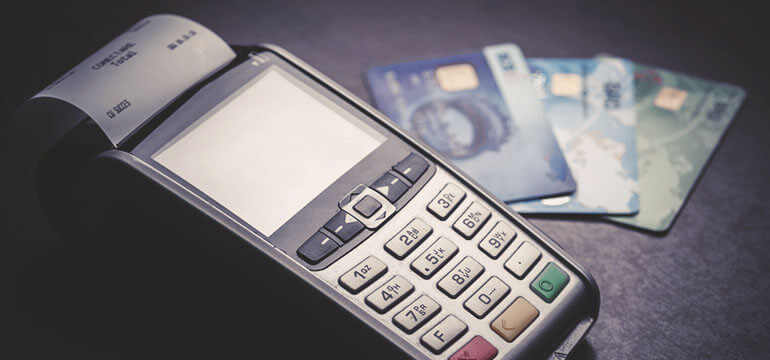
What Type of Card Payment Machine Does Your Small Company Need?
There's a wide range of card payment machines for small business available on the market, therefore it is important to pick equipment that is right for your small business and is also a good fit with the nature of the service. After considering a number of factors including cost, payment options, and functions, you can choose between countertop, portable, and mobile payment machines.
Generally, there are four types of payment options: chip and pin reader, contactless, mobile credit card machine (also called smartphone & smartwatch), and credit card swipe machine.
Most mainstream or smaller banks support and ensure the availability of this functionality with their modern credit card design. It is becoming even more widely recognised to have at least several of these modes available within the business premises since most credit cards already support these technologies.
Countertop Payment Terminal
These are possibly the most common and best credit card machines for small businesses. This works well with small businesses which have only one physical point for transactions to process credit cards rapidly and efficiently.
The reason it is countertop is because the terminal is connected electronically to the merchant account provider, normally via telephone or ethernet line. The most common are chip and pin readers and as magnetic credit card swipe machines. Customer details are recorded and transaction is processed via the card machine provider, which forwards the funds to the merchant’s account.
Great for businesses such as
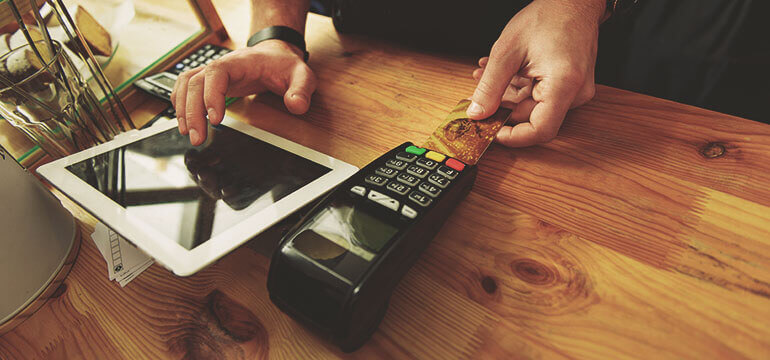
Portable Payment Device
This type of terminal is similar to the countertop type, but with the difference that it can be moved around. Portable credit card machines can be used within your small business' premises and works well in hospitality industries such as a restaurant, where payment takes place at the customer’s table.
Such types credit card machines are connected to a Bluetooth signal which works between the terminal and a payment portal. Additional functions, such as the option for adding gratuity to the bill, can be set up to meet the requirements of the service.
If one owns a small bar, having a portable credit card machine help you to serve your guests in a more effective manner. Creating a single tab helps to retain customers by offering them payment at the table instead of forcing them to go to the bar each time they want to order something.
Great for businesses such as
Mobile Payment Machine
A mobile credit card machine is supported by the GPS connection, nevertheless, it can sometimes be mistaken for a portable credit card machine because both run on wireless networks.
Mobile credit card machine has an add-on attached to the device (phone or a tablet) and works via a card reader app. It is a particularly good card payment machine for small businesses which do not have a single set location. Note that providers which offer a wireless account are slightly different from the regular merchant accounts because they are able to set up a service for you much faster.
Great for businesses such as
Review of the 5 Best Card Payment Machines for Small Business
Whether you are looking for a countertop, portable, or mobile payment machine, one the following five card payment machines for small businesses will make it easier than ever to accept payment by card.

iZettle Card Reader 2
The iZettle Card Reader 2 has quickly become one of the most popular card payment machines for small businesses. Its competitive price was designed specifically for lower volume and can be also used for online selling via iZettle e-commerce.
Key features:
- No fixed monthly cost
- Battery life for up to 8-hours or 100 transactions
- Accepted payments: chip and pin, contactless, and magstripe compatible with Apple, Android, and Samsung pay
- Connects to your mobile phone or tablet via Bluetooth
- Works together with its dedicated free point-of-sale app
- UK based support available
- Taking payment only take seconds
It is a good solution for you if: you are looking for the least expensive and most popular option on the market.
Check out prices on Amazon:

SumUp Air Card Reader
SumUp Air is a great card reader for companies that work with lower volume of transactions as it offers flat and simple transaction fee. Even though SumUp is a less known payment terminal brand, it has become more well known recently, and is currently being the best alternative to iZettle card payment machine for small businesses.
Key features:
- Battery life: up to 8 hours
- Accepted payments: credit and debit cards, chip & pin or magnetic swipe
- No fixed monthly costs and flat transaction fee
- Works with an online application
- Card reader connects to phones and tablets via Bluetooth and is compatible with both iOS and Android
It is a good solution for you if: you just got started and process a lower volume of transactions.
Check out prices on Amazon:
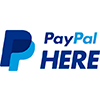
Paypal Here
Paypal Here is a credit card machine solution from Paypal, one of the best known online payment services from Elon Musk, founder of Tesla and SpaceX. The terminal will almost automatically connect with your Paypal account and will allow you to access your fund right after an approved transaction.
Key features:
- Accepted payments: card and contactless payment
- UK-based support
- No monthly fees and fixed contract
- Compatible with Apple pay and Android pay
- Payment quickly arrives to your Paypal account
It is a good solution for you if: you already use Paypal services.
Check out prices on Amazon:
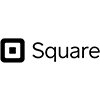
Square Reader
Although Square is relatively new in the UK, it has quickly become the second most popular provider of card payment machine for small business in the UK after iZettle. Square’s CEO, Jack Dorsey also co-founded Twitter, and both businesses are booming.
Key features:
- Accepted payments: chip and PIN card, contactless card and mobile payment.
- Comes with a free point-of-sale app that is compatible with Apple and Android devices including both Smartphones and Tablets
- Can also be used to sell online, by phone and collect payments via invoices
It is a good solution for you if: you are planning to use it only as card machine for your small business. You will get one of the best rates with less restrictions.
Check out prices on Amazon:
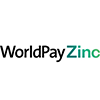
WorldPay Zinc
Worldpay is the UK’s biggest credit card processing company, which has introduced the Zinc model. The Worldpay Zinc model is tailored to offer card payment machines for small businesses by reducing its features to only the essentials. They do not wish to compete with a traditional card payment machine for small business. One big advantage of Worldpay Zinc is that it handles both in person and phone payments.
Key features:
- Accepted payment: credit or debit card supported by Maestro, Visa or MasterCard
- Compatible with iPhone, iPad, Android phones & tablets
- Comes with a 12-month warranty
It is a good solution for you if: you are searching for a fee structure that does not require any commitment or long-term contract or if you wish to accept phone payments.
Before you choose a card payment terminal, you need to compare offers from UK’s leading providers of card payment machines for small business in order to find the most suitable product for your business.

Natalie is a Content Manager at Market Inspector. She is educated in media & communications, and has several years of international experience in marketing and content creation. Natalie’s focus lies in the areas of finance, business communications, sustainability, and more. She and her content team have been published in reputable sites like HubSpot, Comm100, SiteProNews, Small Business Trends, Value Walk, and more.
We strive to connect our customers with the right product and supplier. Would you like to be part of Market Inspector?

